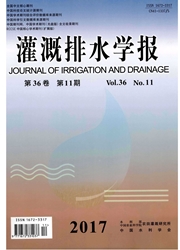

 中文摘要:
中文摘要:
以高(亚)油酸量的食用向日葵为试验材料,研究向日葵生长指标、生物量、产量和营养品质,并结合土壤盐分的时空变化,在盆栽条件下探讨了不同矿化度微咸水滴灌对食用葵花的生长影响。结果表明,土壤含盐量会随着灌溉水矿化度的增加而增加,但在0-30cm土层内并未形成明显的积盐。对于生长指标,微咸水滴溉对株高的影响大于对茎粗的影响,矿化度为3.5g/L时株高显著增大。各处理的根冠比均经过增长—下降—平稳的变化过程,且现蕾至开花期是微咸水灌溉影响最为显著时期。当微咸水矿化度处于较低水平(≤3.5g/L)时,其对葵花产量及产量因素的影响较小。同时,微咸水可以提高和改善作物籽实的营养品质,以矿化度2-3.5g/L增幅最大。因此,在河套灌区等半干旱区,建议葵花微咸水滴灌的临界矿化度为3.5g/L。
 英文摘要:
英文摘要:
In order to explore the effect of different salinity brackish water on edible sunflower of high oleic acid content under the condition of drip irrigation,pot experiments were conducted and the principle index,such as spatial and temporal variations of soil salt,growth index,biomass,yield and nutritional quality,were considered.The results showed that the soil salt content would increase with the increase of irrigation water salinity,but there was no salt deposition in the 0-30cm soil layer.For growth indicator,the influence of brackish water irrigation on the plant height was greater than the effect on stem diameter,of which T3treatment(with salinity of 3.5g/L)increased significantly.The ratio of root to shoot of each treatment showed a process of growth-fall-stable,and squaring to flowering stage was the most sensitive period to the brackish water irrigation.When the concentration of saline water was low(no more than 3.5g/L),the drip irrigation with saline water had less effect on the yield of edible sunflower.Meanwhile,the brackish water,especially salinity of 2-3.5g/L,could improve the nutritional quality of the crop seed.Therefore,it was recommended that critical concentration of saline water should be 3.5g/L for edible sunflower in Hetao irrigation district.
 同期刊论文项目
同期刊论文项目
 同项目期刊论文
同项目期刊论文
 期刊信息
期刊信息
